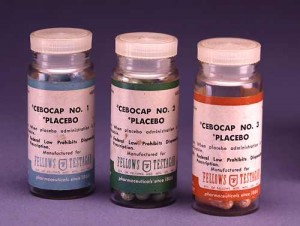Design of Experiments > Placebo Effect
What is the Placebo Effect?
The placebo effect is when a medical intervention results in a positive outcome. It results from the person’s anticipation that the pill or potion will be beneficial, rather than any property of the drug itself. In other words, patients who are more optimistic about an outcome are more likely to have positive outcomes.

In the past, the “placebo effect” was used with derision; people who reported benefits from a suspect, unproven or non-existent treatment (i.e. a sugar pill) were thought to be lying, inauthentic or even delusional. However, modern research is showing that objective changes in brain chemistry (for example, a release of endorphin) are linked to placebos. Interestingly, the placebo effect is even seen in patients who are informed that they are taking placebos.
How much a placebo affects someone depends upon many factors, including:
- The condition being treated.
- How strongly the person believes the placebo will help.
- How subjective the response is. The more subjective the patient’s experience is (for example, a pain scale of 1 to 10), the more likely the placebo effect is to work.
- Several other factors.
Placebo Effect Examples
The placebo effect can be significant. For example, several studies (including this 2010 study and this 2008 one) showed that sham acupuncture (i.e. a placebo) is just as beneficial as regular acupuncture. This study, published in Psychological Science, looked at the relationship between mindset, exercise and health. 84 female room attendants participated in the study. Those women who were told that their work was “exercise” and satisfied the Surgeon General’s requirements for an active lifestyle reported a decrease in several factors including: weight, BMI, and blood pressure. The placebo effect has even been shown to lower cholesterol, as this study shows. But perhaps the most fascinating example of the placebo effect is this study (Placebos in canine epilepsy trials), which demonstrates the effect isn’t just limited to humans; dogs can benefit from the placebo effect too!
References:
Harvard Health